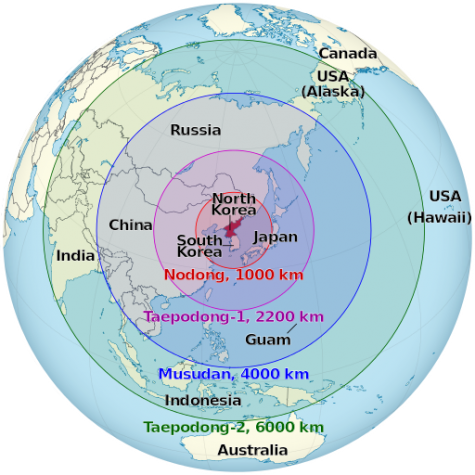To Bomb or Not To Bomb
First, it was Russians hacking the 2016 election, then the bombs dropped in Syria, and now North Korea is threatening war. What do we do? At this point, nobody, not even the United States government, has a correct answer to this question. Still searching for an answer, no method is off the table, but weapons and violence are not the methods to use.
Recently, U.S. President Donald Trump invited Chinese President Xi Jinping to visit to discuss various issues. They talked about the trade deals the U.S. has with China, and how to strengthen them in the near future. Most importantly, they discussed what should be done about North Korea and the nuclear threat they pose.
Throughout his campaign, Trump spoke adamantly about strengthening our ties with Russia, and stood up for Russian President Vladimir Putin on numerous occasions. Now it seems Trump has dumped Russia for China. A bold move, considering we have not only had historical issues with China, but China is also North Korea’s biggest ally. They supply North Korea with not only food and energy, but also with arms. Hearing that is probably confusing… Why is the U.S. president meeting with North Korea’s biggest ally to talk about how to stop North Korea? Because the United States government doesn’t seem to know what to do or where to turn. According to Xinhua, the state news agency of China, Trump made a phone call to Jinping to discuss what to do about North Korea. Jinping told Trump that problems in North Korea should be solved using peaceful methods. Peaceful methods are seeming less and less likely to solve the problems at hand, but that doesn’t mean it’s okay to start with violence.
On Saturday, April 15th, North Korea celebrated one of the most important holidays in their culture, Day of the Sun, which is the birthday of Kim Il-Sung, the nation’s founder. According to a CNN report, it was expected that Kim Jong-un—the grandson of Kim Il-Sung, and now leader of the country—would use the occasion to launch the sixth nuclear missile since the first in 2006. While the missile was not launched that day, it was the following day, and it blew up in the air within five seconds. This was a great embarrassment to the country because this particular missile was meant to be a warning to the U.S. to back off and move the U.S. ships that they have positioned close to the North Korean peninsula.
Vice President Mike Pence went to South Korea this past weekend to discuss what to do about the ongoing feud with North Korea. During his visit, he warned North Korea not to test the United States, but that the U.S. would also be willing to talk about where to go from here.
So now what do we have? We have a possible alliance with China, an unhappy Syrian government, and North Korea taunting us with their nuclear weapons. America, land of the free and home of the brave, isn’t sure where to turn. The U.S. should not turn to the offensive. The U.S. should not resolve to bombing North Korea unless they attack first.
North Korea is not Syria. The U.S. dropped missiles in Syria because their leader Bashar al-Assad was using chemical weapons on the Syrian people. The Syrian army does not begin to compare to North Korea’s. Syria does not have the technology that North Korea does to launch missiles at the U.S. Bombing them was not putting the U.S. in much danger, but bombing North Korea would.
The use of chemical weapons is barbaric, but Kim Jong-un is not using chemical weapons against his people. However North Korea does use hard labor as punishment, and a large percentage of the children in the country are malnourished. That being said, many countries across the globe face these problems as well, and the U.S. isn’t stepping in to help every country resolve their issues. Why should North Korea be any different? It shouldn’t, and therefore the only legitimate reason for the U.S. to bomb North Korea is in an act of self-defense. The reason to wait is because we have nothing to defend ourselves against—at least not yet. North Korea hasn’t shown that their missiles can reach U.S. soil so we don’t have a legitimate reason to bomb them.
In George Washington’s farewell address, he warned us against the “peril of foreign entanglements.” The U.S. has never been good at following this advice. There have been times where this has helped us, for example World War II. There were a lot of reasons why the U.S. stepped in but it had the positive effect of helping get the country out of the Great Depression. There have been other times where it has done more bad than good. Dropping the atomic bombs on Hiroshima and Nagasaki had serious consequences that are still being dealt with today. North Korea knows that, as a country, the U.S. loves to stick its nose into other countries’ businesses. By flaunting their missiles and bombs, they are setting a trap that the U.S. could easily fall into. When weapons are sighted or made, the U.S. often goes to go defend and protect whoever is in danger. This time there needs to be a different strategy. Patience is key, and as hard as that is for the U.S., that skill is what needs to be exercised as the U.S. looks for a solution.
“If the US does any reckless provocation, we will immediately apply a destructive strike with our revolutionary power.” Choe Ryong Hae, a senior member of the Presidium of the Political Bureau of the Workers’ Party of Korea (WPK) said during the Day of the Sun parade, according to a CNN report regarding the large celebration. “We’re prepared to respond to an all-out war with an all-out war and we are ready to hit back with nuclear attacks of our own style against any nuclear attacks.”
If North Korea has all the bombs and missiles that they claim to have, and the ability to launch them, why haven’t they? As unfortunate as it is to say, North Korea has intelligent people working. They have been sitting in their own territory, not letting anyone inside, simply surveying the world’s strengths and weaknesses. They are using all of that to their advantage. They know the U.S. has never been good at sitting back and letting things play out without getting involved and acting first. They also know that they are allies with two of the U.S.’s biggest problems, China and Russia.
What North Korea decides to do in the future will change whether or not the U.S. should sit back. If they bomb the U.S., then the U.S. will fight back, and if they bomb another country the U.S. will most likely step in as well. The bottom line is that the U.S. shouldn’t be the first to attack, because once one bomb is dropped, there is no going back.










